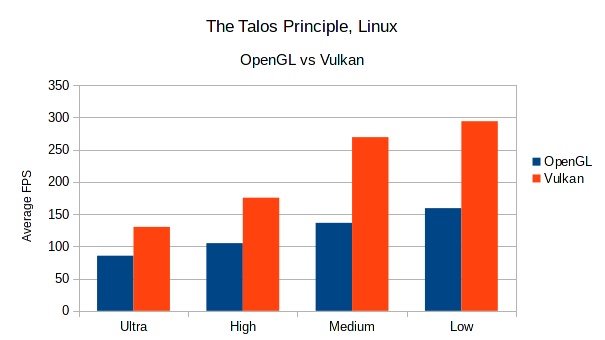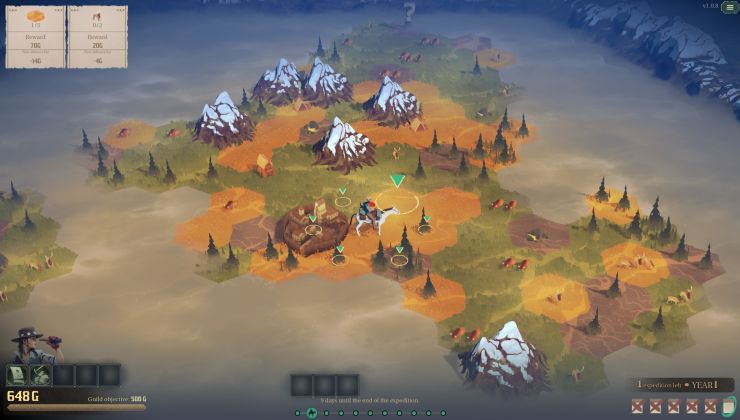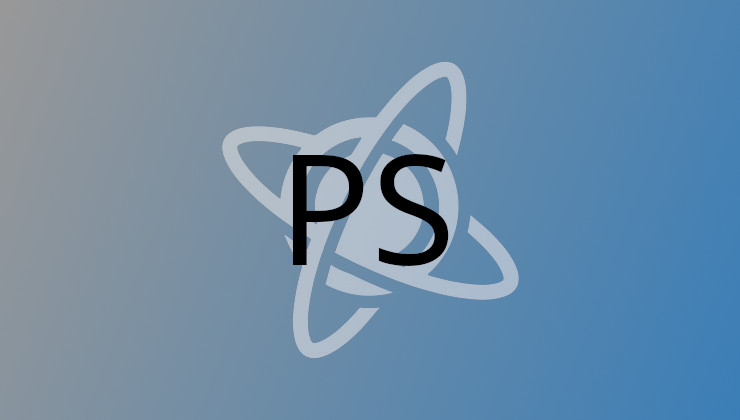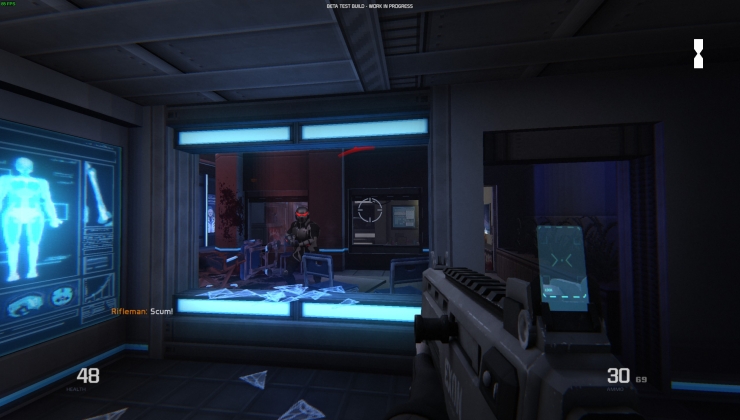Croteam have put out yet another stable build of The Talos Principle [Steam], which brings improvements for the Vulkan version. I did some fresh benchmarks and the difference is quite amazing.
From the update notes:
To use the Vulkan version, you need to load the 64bit build of The Talos Principle and then switch to Vulkan in the graphics settings.
Here's some benchmarks done on my main rig, specifications: i7 5960x, 980ti, 1080p, Antergos + XFCE
Speaks for itself. This is hopefully the shape of things to come with Linux games powered by Vulkan, giving us a much more even chance against Windows versions of games.
I've tested other games that use Vulkan and all show improvements over OpenGL, but you will see for yourself whenever they get released.
From the update notes:
Quote- General stability and performance improvements on Vulkan API.
To use the Vulkan version, you need to load the 64bit build of The Talos Principle and then switch to Vulkan in the graphics settings.
Here's some benchmarks done on my main rig, specifications: i7 5960x, 980ti, 1080p, Antergos + XFCE
Speaks for itself. This is hopefully the shape of things to come with Linux games powered by Vulkan, giving us a much more even chance against Windows versions of games.
I've tested other games that use Vulkan and all show improvements over OpenGL, but you will see for yourself whenever they get released.
Some you may have missed, popular articles from the last month:
Quoting: natewardawgOkay, I did some benchmarks with DirectX 11 under Windows 10, Vulkan under Linux, and OpenGL under Linux. I ran the benchmark on a GTX 960 and an i7-6700K using the 60 second benchmark. If it says Ultra, then all settings were set to Ultra, for Medium, all settings were set to Medium, etc. If anyone wants to know a particular combination feel free to ask.
Here are the results:
D3D 11:
Ultra: 45.6
Medium: 172.6
Lowest: 355.2
Vulkan Linux:
Ultra: 41.6
Medium: 158.3
Lowest: 419.3
OpenGL Linux:
Ultra: 36.5
Medium: 101.0
Lowest: 263.2
So, we are getting much closer :) It's interesting when put on low settings that Vulkan completely smokes D3D11 by almost 70 fps. I'm wondering if this has to do with multi-threading vs the pseudo multi-threadedness of D3D11?
Can you do the Vulkan and the OpenGL benchmarks under windows too?
I want to see the difference between Vulkan-Windows vs Vulkan-Linux and OpenGL-Windows vs OpenGL-Linux.
0 Likes
Quoting: Purple Library GuyQuoting: KimyrielleI rarely look at performance numbers and benchmarks, as I am happy when game runs with enough FPS for me to be able to play it. I would however be curious if there are OTHER components holding back Linux performance other than OpenGL. In other words, if a game uses Vulkan on both Windows and Linux, would it perform exactly the same on both Linux and Windows? Or would Linux still be worse?OK, disclaimer, I'm no developer and I can't back this up.
But the general zeitgeist I have from following vaguely this sort of thing for years comes down to: Aside from OpenGL problems, up to now graphics card drivers for Linux have tended to be slower, although that situation too has been improving and the nature of Vulkan seems to be such that it probably won't be nearly as much an issue for Vulkan stuff. But OS to OS, Linux itself is probably faster than Windows, and certainly lighter, so it wouldn't hog as much CPU or memory for itself, leaving more for the game. The "lighter" part of course depends on specifics like, KDE or XFCE or what? As I say, this is my general impression which I cannot cite any sources to defend, so take it for what it's worth.
All modern OS are comparable in performance ( i.e. no big advantages ). They have differing design philosophies which can have an impact, and as you point out the quality of drivers and other code libraries can also affect performance. My cross-platform Linux/Windows code tends to run a little faster in Linux, but as it is developed using Linux-based libraries ported through MinGW to Windows, that is probably to be expected.
It is honestly very difficult to properly compare APIs or compare OS performance without actually viewing the source to verify that what you are comparing is reasonable. For example, the croteam OpenGL implementation may just not be as "good" in terms of best practice and optimization as their Vulkan implementation. All good developers learn constantly, but it doesn't mean you have the time or inclination to go back and improve older stuff once you realize it sucks :-)
I'm more with Kimyrielle, in that I don't care how many FPS, as long as it's good for my personal perception, which typically means consistency and responsiveness over pure frame-rate.
0 Likes
Quoting: Comandante ÑoñardoCan you do the Vulkan and the OpenGL benchmarks under windows too?
I want to see the difference between Vulkan-Windows vs Vulkan-Linux and OpenGL-Windows vs OpenGL-Linux.
Yep, here you go. I put them all here again for easy reading :)
Vulkan (Linux):
Ultra: 41.6
Medium: 158.3
Lowest: 419.3
Vulkan (Windows):
Ultra: 42.6
Medium: 166.8
Lowest: 387.7
OpenGL (Linux):
Ultra: 36.5
Medium: 101.0
Lowest: 263.2
OpenGL (Windows):
Ultra: 36.3
Medium: 101.2
Lowest: 343.5
D3D 11 (Windows):
Ultra: 45.6
Medium: 172.6
Lowest: 355.2
So, the numbers are about the same for Vulkan between Ultra and Medium, with it doing fairly better on Linux for Lowest settings (which is neat to see). OpenGL is almost exactly the same for Ultra and Medium, but doing significantly better on Windows (which I personally find interesting). Also, all tests were done with 1920x1080 resolution.
Last edited by natewardawg on 5 March 2017 at 3:13 am UTC
1 Likes, Who?
Vulkan just won't run for me in Linux. I get a black screen, then it reloads into OpenGL.
I got the following numbers though:
Settings:
Resolution 3840x2160
Max3d rendering Mpix 2.4
Multi-sample AA Medium
Vsync- disabled
Triple buffering- disabled
CPU Ultra
GPU Ultra
GPU Memory Ultra
Level Caching Ultra
Max fps Unlimited
With both DX9 & 11 it maxed out at around 155fps.
GPU utilization was 100% for GPU1 & 92% for GPU2.
CPU was at 33% with 1 core maxing, 3 more at around 40% & the rest idle.
Linux Mint 18 Nvidia driver version 375 (tried 367 as well with no change).
OpenGL 55.3 fps
Vulkan :(
Windows 10 Nvidia driver 378.66
OpenGL 65.4 fps
DX9 94.5 fps
DX9 SLI 156.2 fps
DX11 94.0 fps
DX11 SLI 154.6 fps
Vulkan 88.3 fps (did not use both GPUs, not sure if I need to enable multigpu somehow, or if it is not implemented yet).
https://www.youtube.com/watch?v=rLjHXyh1pps
I got the following numbers though:
Settings:
Resolution 3840x2160
Max3d rendering Mpix 2.4
Multi-sample AA Medium
Vsync- disabled
Triple buffering- disabled
CPU Ultra
GPU Ultra
GPU Memory Ultra
Level Caching Ultra
Max fps Unlimited
With both DX9 & 11 it maxed out at around 155fps.
GPU utilization was 100% for GPU1 & 92% for GPU2.
CPU was at 33% with 1 core maxing, 3 more at around 40% & the rest idle.
Linux Mint 18 Nvidia driver version 375 (tried 367 as well with no change).
OpenGL 55.3 fps
Vulkan :(
Windows 10 Nvidia driver 378.66
OpenGL 65.4 fps
DX9 94.5 fps
DX9 SLI 156.2 fps
DX11 94.0 fps
DX11 SLI 154.6 fps
Vulkan 88.3 fps (did not use both GPUs, not sure if I need to enable multigpu somehow, or if it is not implemented yet).
https://www.youtube.com/watch?v=rLjHXyh1pps
0 Likes
Quoting: natewardawgQuoting: Comandante ÑoñardoCan you do the Vulkan and the OpenGL benchmarks under windows too?
I want to see the difference between Vulkan-Windows vs Vulkan-Linux and OpenGL-Windows vs OpenGL-Linux.
Yep, here you go. I put them all here again for easy reading :)
Vulkan (Linux):
Ultra: 41.6
Medium: 158.3
Lowest: 419.3
Vulkan (Windows):
Ultra: 42.6
Medium: 166.8
Lowest: 387.7
OpenGL (Linux):
Ultra: 36.5
Medium: 101.0
Lowest: 263.2
OpenGL (Windows):
Ultra: 36.3
Medium: 101.2
Lowest: 343.5
D3D 11 (Windows):
Ultra: 45.6
Medium: 172.6
Lowest: 355.2
So, the numbers are about the same for Vulkan between Ultra and Medium, with it doing fairly better on Linux for Lowest settings (which is neat to see). OpenGL is almost exactly the same for Ultra and Medium, but doing significantly better on Windows (which I personally find interesting). Also, all tests were done with 1920x1080 resolution.
Thank you for the info. :)
Sadly, this is the exception to the rule, because Croteam are the exception to the rule..
They are true developers..
You can see the passion in their work and the evidence of that are the continuous upgrades and improvements in a game that is more than two years old...
The Linux version of The Talos Principle is not a port of a Windows game; is an in-house developed Linux game and that should be the standard of Linux games...
But, I don't see porters like Feral, VP or Aspyr following the path of Croteam in matter of upgrades..
Games like Tomb Raider, Life is Strange, Mad Max, Deus Ex Mankind Divided will benefit of an upgrade to Vulkan, but that won't happen because is Feral...
Maybe the future linux port of Rise of the Tomb Raider will use Vulkan from scratch..Who knows.
Games like both Metro Redux don't need Vulkan upgrades, because they are in-house Linux games with a performance that is close to the windows versions. The only update they need is to add a resolution control in the graphics options and Physx by GPU, but I don't think it will happen because those games are abandonware.
I purchased the game twice; one for my windows account and another for my Linux account.
I give Croteam 9 of 10
0 Likes
@Mora, you're running the 64bit Talos right? It only works on that as far as I know.
0 Likes
Quoting: Comandante ÑoñardoThe Linux version of The Talos Principle is not a port of a Windows game; is an in-house developed Linux game and that should be the standard of Linux games...Croteam is a cool developer, but this is sadly not true. They've admitted that the graphics engine is designed around D3D, and other backends suffer as a result. They're working on a redesign and their new VR releases are likely to benefit from this work, but Talos is very much a Windows game they ported (in-house) to Linux.
2 Likes, Who?
Quoting: Comandante ÑoñardoSadly, this is the exception to the rule, because Croteam are the exception to the rule..
They are true developers..
You can see the passion in their work and the evidence of that are the continuous upgrades and improvements in a game that is more than two years old...
The Linux version of The Talos Principle is not a port of a Windows game; is an in-house developed Linux game and that should be the standard of Linux games...
But, I don't see porters like Feral, VP or Aspyr following the path of Croteam in matter of upgrades..
Unfortunately, it doesn't really makes sense *right now* that porters would even use Vulkan due to lack of experience. Feral did say they're going to start experimenting with Vulkan early this year, which means they're probably already doing it. My guess is with Deus Ex:MD first. It makes a lot of sense that Croteam is pushing hard with Vulkan in TP since, correct me if I'm wrong, Serious Sam 4 is using the same engine as Talos Principle. Feral porting the 2013 Tomb Raider game to Vulkan doesn't trickle down to any other game. In other words Croteam adding Vulkan support to TP directly affects other games, therefore they didn't really loose time or money because they have a fully finished title to test the Vulkan support with. Feral adding Vulkan to Tomb Raider doesn't affect anything else and therefore is a big time/money sink.
What I'm really trying to say is this... I don't think Feral, VP, Aspyr, etc not porting their games to Vulkan has anything to do with a lack of desire to do so, I think they really would love to, but it just doesn't make financial sense to do so. It makes more sense for them to focus on getting us other great games which is good for them and us. Croteam does have a financial incentive to port games like TP to Vulkan since it affects other future titles, which is good for both them and us.
While I'm with 100% you that I would love to see these games ported to Vulkan, I think these companies are making the right decision by not porting some of these older titles to Vulkan. Probably more to come from them, with Vulkan, in the future :)
Last edited by natewardawg on 6 March 2017 at 12:43 pm UTC
1 Likes, Who?
Quoting: liamdawe@Mora, you're running the 64bit Talos right? It only works on that as far as I know.
Yep, I sure am. It could have something to do with running 4k or SLI maybe. I've tried it on previous versions of Talos as well & have never had Vulkan work.
0 Likes
Quoting: GuestQuoting: inlinuxdudeStill can't get it to run without crashing with Vukan on my home-built SteamOS brewmaster box.. :( Tried from the menus and with launch option.. booAre you running an AMD gpu? [...]
Nope, Nvidia 970..
Last edited by inlinuxdude on 13 March 2017 at 2:53 pm UTC
0 Likes









See more from me